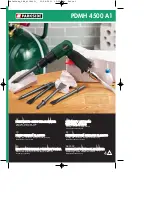
ENGLISH
en
9
Original instructions
We, being solely responsible, hereby declare that
this product conforms to the standards and
directives specified on page 3.
The band file is used for dry sanding, deburring and
polishing metals, wood, materials similar to wood,
plastics and construction materials.
The user bears sole responsibility for any damage
caused by improper use.
Generally accepted accident prevention
regulations and the enclosed safety information
must be observed.
WARNING
– Reading the operating
instructions will reduce the risk of injury.
WARNING Read all safety warnings and
instructions.
Failure to follow all safety
warnings and instructions may result in electric
shock, fire and/or serious injury.
Keep all safety instructions and information for
future reference.
Before using the power tool, carefully read through
and familiarise yourself with all the enclosed safety
information and the Operating Instructions. Keep all
enclosed documentation for future reference, and
pass on your power tool only together with this
documentation.
For your own protection and for the
protection of your power tool, pay
attention to all parts of the text that are
marked with this symbol!
Hold the tool by the insulated gripping
surfaces.
Damage to a "live" wire may energise
metal parts of the power tool and cause an electric
shock.
Flying sparks are created when sanding metal.
Ensure that no persons are in danger. Due to the
risk of fire, all combustible materials must be
removed from the work area (area affected by flying
sparks).
Use of a fixed extractor system is recommended.
Materials that generate dusts or vapours that may
be harmful to health must not be processed.
Wear ear protectors. Exposure to noise can cause
hearing loss.
Wear protective gloves.
Always wear protective goggles.
Secure the workpiece against slipping, e.g. with the
help of clamping devices.
Always guide the machine with both hands on the
handles provided. Loss of control can cause
personal injury.
Never place your hand near rotating parts of the
device or near the rotating sanding belt.
Remove sanding dust and similar material only
when the machine is not in operation.
Remove the battery pack from the machine before
any adjustments, conversions or servicing are
performed.
Before fitting the battery pack, make sure that the
machine is switched off.
The rated speed of the sanding belt must be at least
equal to the belt speed in idling marked on the
power tool. A sanding belt running faster than its
rated speed can break and fly apart.
Check prior to each use that the sanding belt is
correctly attached and is completely on the rollers.
Carry out a trial run: Allow the machine to run at
idling speed for 30 seconds in a safe location. Stop
immediately if significant vibrations occur or if other
defects are noted. If such a situation occurs, check
the machine to determine the cause.
4.1 Safety instructions for battery packs:
Protect battery packs from water and
moisture!
Do not expose battery packs to naked flame!
Do not use faulty or deformed battery packs!
Do not open battery packs!
Do not touch or short-circuit battery packs!
Slightly acidic, flammable fluid may leak from
defective Li-ion battery packs!
If battery fluid leaks out and comes into
contact with your skin, rinse immediately
with plenty of water. If battery fluid leaks out
and comes into contact with your eyes, wash them
with clean water and seek medical attention
immediately.
If the machine is defective, remove the battery pack
from the machine.
Reduce dust exposure:
Some dust created by using this power tool
may contain chemicals known to cause
cancer, allergic reaction, respiratory disease, birth
defects or other reproductive harm. Some
examples of these chemicals are: Lead from lead-
based paints, crystalline silica from bricks and
cement and other masonry products, Arsenic and
chromium from chemically-treated lumber, hard
wood like oak or beech, Metals, Asbestos.
The risk from these exposures depends on how
1. Declaration of Conformity
2. Specified Use
3. General Safety Instructions
4. Special Safety Instructions























